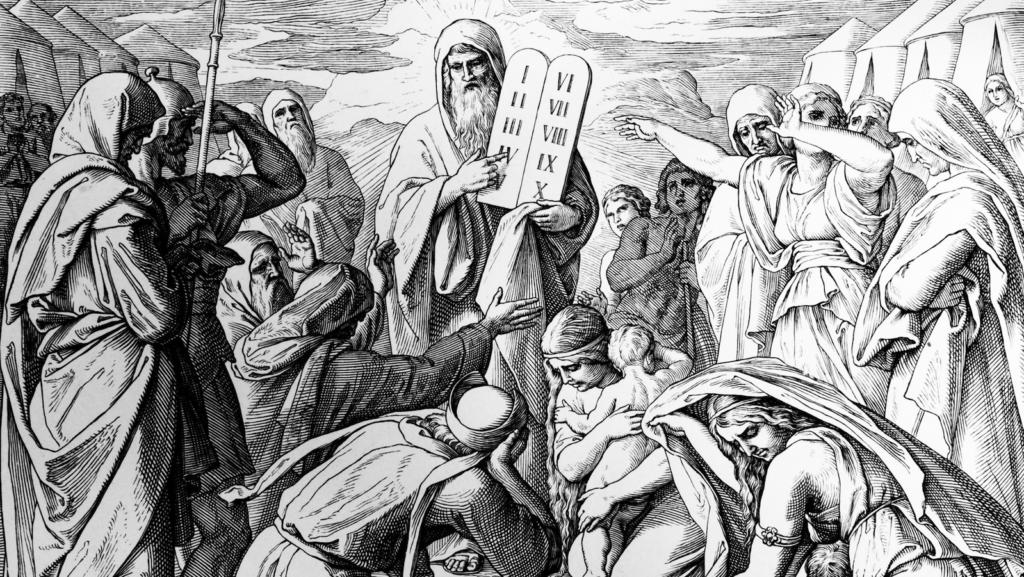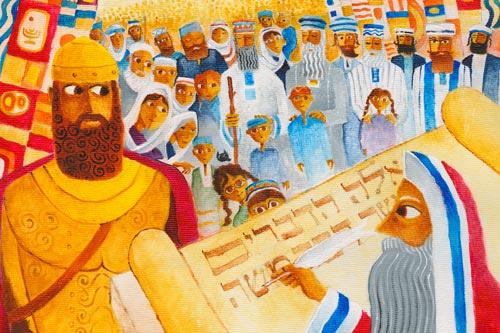Hi Bonjour / Hello [nickname_else_first_name],
Table of contents
1) Perashat Hashavoua - Rabbi Eli Mansour
2) Halakhat Hashavoua (Halakhot related to day to day life)- Tisha B'av - Hazzan David Azerad
3) Holy Jokes!
SHABBAT HAZON
Shabbat Chazon ("Sabbath [of] vision" שבת חזון, also Shabbat Hazon) is named for the "Vision of Isaiah over Judah and Jerusalem" (Book of Isaiah 1:1-27) that is read as the Haftarah on this Shabbat at the end of the three weeks between dire straits, which precede the mournful fast of Tisha B'Av
-Wikipedia
Tisha B'Av (Saturday Sundown to Sunday Sundown)
Tisha B'Av (Hebrew: תִּשְׁעָה בְּאָב[a] Tīšʿā Bəʾāv; IPA: [tiʃʕa beˈʔav] ( listen), lit. "the ninth of Av") is an annual fast day in Judaism, on which a number of disasters in Jewish history occurred, primarily the destruction of both Solomon's Temple by the Neo-Babylonian Empire and the Second Temple by the Roman Empire in Jerusalem.
listen), lit. "the ninth of Av") is an annual fast day in Judaism, on which a number of disasters in Jewish history occurred, primarily the destruction of both Solomon's Temple by the Neo-Babylonian Empire and the Second Temple by the Roman Empire in Jerusalem.
Tisha B'Av marks the end of the three weeks between dire straits and is regarded as the saddest day in the Jewish calendar, and it is thus believed to be a day which is destined for tragedy.[2][3] Tisha B'Av falls in July or August in the Gregorian calendar.
The observance of the day includes five prohibitions, most notable of which is a 25-hour fast. The Book of Lamentations, which mourns the destruction of Jerusalem, is read in the synagogue, followed by the recitation of kinnot, liturgical dirges that lament the loss of the Temples and Jerusalem. As the day has become associated with remembrance of other major calamities which have befallen the Jewish people, some kinnot also recall events such as the murder of the Ten Martyrs by the Romans, expulsions from England, Spain and elsewhere, massacres of numerous medieval Jewish communities during the Crusades, and the Holocaust.
-Wikipedia
1)PERASHAT HASHAVOUA
This Week's Parasha Insight with Rabbi Eli Mansour
Parashat Devarim- The Root Cause of the Hurban
Each year we discuss Tisha BeAv and the destruction of the First and Second Temple before Parashat Devarim. Of course, we hope that these words will not be necessary or relevant, as we pray that the Bet HaMikdash will be rebuilt. Similarly, some report that a certain famous rabbi would put his Kinot is geniza each year, and buy a new book each year, hoping that each year will be the last year.
The Talmud (Yoma 9a) teaches that the first Temple was destroyed because the people violated three cardinal sins: Idol worship, forbidden sexual relations, and bloodshed. The Second Temple, however, was destroyed due to "sinat hinam" - wanton hatred. The gemara then asks, and in the First Temple era was there really no baseless hatred? The gemara suggests that while during the First Temple period it was only the leaders of the nation who harbored baseless hatred for each other, during the Second Temple period, the nation as a whole engaged in wanton hatred.
The Talmud further suggests that during the First Temple period, the sin was exposed and evident to all therefore, and they made no attempt to hide their behavior. In this case their punishment was also revealed and they knew that they would return to the Land after seventy years. During the Second Temple period, however, the people attempted to disguise their behavior, and therefore, the scope and extent of their punishment was also disguised and kept a secret.
Let us ask a simple question: What is the sin of "sinat hinam"? Seemingly, eating hametz on Pesah, or violating the Shabbat are worse sins! There seem to be so many more severe sins than sinat hinam. Why do the Rabbis insist that the Temple was destroyed due to sinat hinam? Interestingly, elsewhere (Nedarim 81a) the Talmud attributes the destruction of the First Temple to the people not reciting Birkot HaTorah, the blessings said each morning before learning Torah. Here too, we must ask, is it possible that this is the reason for the destruction of the first Temple and the exile of the Jewish people?
I would like to suggest the following idea: While it is true that during the First Temple period they violated the three cardinal sins, the Rabbis searched for the source, the reason for their sins. The Rabbis suggested, based upon a verse in Yirmiyahu (9:11), that the people did not say the blessings over the Torah. Do the Rabbis really believe that the Temple was destroyed because the people did not recite the Birkot HaTorah before studying Torah?
The word "Torah" means instruction. The Torah is a guide; an instruction manual. Torah is meant to offer guidance and refine the character of a person. The Rabbis teach that the non-Jews have much wisdom, "hochma bagoyyim ta’amin"; however, they do not have Torah, i.e. their wisdom is not intended to change and refine a person. There is a separation between the philosophy and the behavior.
R. Meir Shapiro, the founder of the Daf HaYomi, noted that in Pirkei Avot, each and every teaching is attributed to a person, because the ethical teachings can be demonstrated by the behavior of its teacher.
However, Torah only changes, and elevates a person when it is studied with the proper intention. When we see people who learn Torah but do not behave properly, we must assume that they are not learning Torah properly.
The Rabbis wondered how, during the First Temple Period, people who are learning Torah could also violate these three grave sins? They explained that "they did not recite the blessings before [studying Torah]," in other words, they did not put the Torah in the proper context and learn it properly, with the right intentions. The purpose of Torah is to grow into a better person.
Therefore, the root cause of the destruction of the first and second Temple was not really the three cardinal sins, or sinat hinam, rather, the Temples were destroyed because they learned Torah without any intention to change. During the First Temple, this improper learning led to the violation of the three sins, and during the Second Temple, it led to sinat hinam. Unfortunately, the Temple has not been rebuilt because we haven’t yet succeeded in internalizing our Torah study, and allowing the Torah to shape and refine our personality, and become better people.
The Talmud relates that Rabbi Akiba taught, "ve’ahavta lere’acha kamocha- zeh klal gadol baTorah" – "And you shall love your neighbor as yourself, this is a great principle in the Torah." We can explain that the "klal gadol", the "great principle"- is the essence of Torah, and loving our fellow man is an outgrowth of the proper approach to and study of the Torah.
2) HALAKHAT HASHAVOUA
Selected & translated by David Azerad, Hazzan Maghen Abraham
The Laws of Tisha Be’Av according to the rulings of Maran Rabbi Obadiah Yosef ZT”L
What can one eat during the meal before the fast begins when it falls on Shabbat?
On the eve of Tisha Be'Av, which falls on Shabbat, one can eat and drink all kind of foods including meat and wine as well as during Seudah Shelisheet.One can sing Shabbat songs and be joyful and happy because it is forbidden to mix the mourning of the destruction of the Temple with the joy of Shabbat. One should only be carefull to finish the meal a few minutes before sunset.
When does Tisha Be'Av fast begin and end?
The fast begins at sunset. However,one should stop eating and drinking about five minutes before sunset.The next day, after the stars have come out, you are allowed to eat and drink and there is no need to wait after the Zeman of Rabenu Tam, which comes out later.
From sunset until sunrise the next day, it is forbidden to eat and drink, wash, anoint (perfume), wear leather shoes or have intimate relations. All the laws in this matter are equal between men and women.
Bevirkat Shabbat Shalom Umevorach
David Azerad
3) HOLY JoKeS!!
Selection of funny snippets, loosely related to this weeks parashah, to brighten your day












